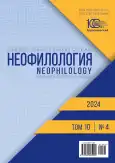King Philip II of Spain as the prototype of the Grand Inquisitor in F.M. Dostoevsky’s novel “The Brothers Karamazov”
- Authors: Yudakhin A.A.1
-
Affiliations:
- A.S. Griboyedov Moscow University
- Issue: Vol 10, No 4 (2024)
- Pages: 903-910
- Section: RUSSIAN LITERATURE AND LITERATURE OF PEOPLES OF RUSSIAN FEDERATION
- URL: https://journal-vniispk.ru/2587-6953/article/view/295629
- DOI: https://doi.org/10.20310/2587-6953-2024-10-4-903-910
- ID: 295629
Cite item
Full Text
Abstract
INTRODUCTION. The Spanish plot forms an important symbolic, semantic and artistic layer of the Grand Inquisitor Legend by F.M. Dostoevsky. The purpose of the study is to identify and analyze the typological similarity of the Spanish King Philip II (1527–1598) and the Grand Inquisitor Dostoevsky in the context of the author’s idea of the “Legend”.MATERIALS AND METHODS. The object of the study is the insertion parable of Ivan Karamazov in F.M. Dostoevsky’s novel “The Brothers Karamazov”, as well as handwritten editions and rough sketches for the “Legend”. The methodological basis of the research includes the comparative historical method, cultural-historical and system-typological analysis.RESULTS AND DISCUSSION. The study revealed the presence of a complex typological correlation between the image of King Philip II, attested by historical literature, and the artistic image of the Grand Inquisitor of the Legend. The characteristics of both characters, such as despotism, pride, amoralism, fanaticism, asceticism and recluse, go back to two basic categories that build the life and behavior model of the characters – godliness and the will to power. In the context of Dostoevsky’s anti-Catholic polemic, such similarity of portraits (spiritual constitution and psychological type) of the Inquisitor king and the Grand Inquisitor acquires special significance.CONCLUSION. The revealed typological correlation between historical and artistic images suggests that the Inquisitor King Philip II, as an iconic character in Spanish history, served as one of the prototypes of the main character of Dostoevsky’s “Legend”.
About the authors
A. A. Yudakhin
A.S. Griboyedov Moscow University
Author for correspondence.
Email: Artemyudakhin@yandex.ru
ORCID iD: 0000-0003-4552-859X
Cand. Sci. (Philology), Associate Professor of History of Journalism and Literature Department
1 bldg, 35 Novaya Basmannaya St., Moscow, 105066, Russian FederationReferences
- Kharitonov T.I. The image of the Grand Inquisitor in state and in revolution. The political theology of Dos-toevsky and Berdyaev. Sotsiologiya vlasti = Sociology of Power, 2022, vol. 34, no. 2, pp. 96-124. (In Russ.) https://doi.org/10.22394/2074-0492-2022-2-96-124, https://elibrary.ru/sqplis
- Kudryavtseva V. The image of the Grand Inquisitor F.M. Dostoevsky: dynamics of interpretations. Zbornik Matitse srpske za slavistiku = Matica Srpska Journal of Slavic Studies, 2022, vol. 2022, no. 101, pp. 291-300. (In Russ.) https://doi.org/10.18485/ms_zmss.2022.101.17
- Sokolov B. Two councils by A.N. Maykov in F.M. Dostoevsky’s novel The Brothers Karamazov. Vestnik Ros-siiskogo universiteta druzhby narodov. Seriya: Literaturovedenie, zhurnalistika = RUDN Journal of Studies in Literature and Journalism, 2021, vol. 26, no. 3, pp. 442-450. https://doi.org/10.22363/2312-9220-2021-26-3-442-450, https://elibrary.ru/yurfhh
- Isaev S.A. Dostoyevsky and Lutheranism. Khristianskoe chtenie = Christian Reading, 2021, no. 4, pp. 44-49. (In Russ.) https://doi.org/10.47132/1814-5574_2021_4_44, https://elibrary.ru/acgipx
- Kazakov A.A. The plot of the meeting with the Devil: Luther – Ivan Karamazov – Adrian Leverkun. Materialy Mezhdunarodnykh nauchnykh chtenii pamyati Aleksandra Sergeevicha Yanushkevicha: «Zhukovskii i drugie». K 75-letiyu so dnya rozhdeniya = Proceedings of the International Scientific Readings in Memory of Alexander S. Yanushkevich “Zhukovsky and Others”. On the 75th Anniversary of His Birth. Tomsk, Tomsk State University Publ., 2020, pp. 478-486. (In Russ.) https://elibrary.ru/kmetoo
- Lipke Sh. The image of Pope Pius IX in F.M. Dostoevsky’s journal essays (1870–1878). Dostoevskii i mirovaya kul’tura. Filologicheskii zhurnal = Dostoevsky and World Culture. Philological Journal, 2019, no. 2 (6), pp. 179-190. (In Russ.) https://doi.org/10.22455/2619-0311-2019-2-179-190, https://elibrary.ru/gxzklv
- Yudakhin A.A. The polemic of F. M. Dostoevsky with catholicism: towards the formulation of the problem. Litera, 2023, no. 5, pp. 125-142. (In Russ.) https://doi.org/10.25136/2409-8698.2023.5.38246, https://elibrary.ru/ufkime
- Yudakhin A.A. “Do you know, I have thought of giving up the world to the Pope...”: the anti-catholic layer of the novel by F.M. Dostoevsky “Demons”. Neofilologiya = Neophilology, 2023, vol. 9, no. 3, pp. 573-581. (In Russ.) https://doi.org/10.20310/2587-6953-2023-9-3-573-582, https://elibrary.ru/wglzmu
- Aloe S. Italy in the biography of F. M. Dostoevsky: several introductory notes about the archival finds of Valen-tina Supino. Neizvestnyi Dostoevskii = The Unknown Dostoevsky, 2019, vol. 6, no. 1, pp. 3-9. (In Russ.) https://doi.org/10.15393/j10.art.2019.3801, https://elibrary.ru/wafmpl
- Barsht K.A. “...was passing in blessing, the Pope antichrist”. About one paradoxical wording in the preparatory materials for F.M. Dostoevsky’s novel “The Possesed”. Novyi filologicheskii vestnik = The New Philological Bulletin, 2019, no. 2 (49), pp. 116-131. (In Russ.) https://doi.org/10.24411/2072-9316-2019-00037, https://elibrary.ru/vcodio
- Volkova A.A., Frolova E.V. F.M. Dostoevsky’s historical views on the Roman Catholic Church. Byulleten’ sotsial’no-ekonomicheskikh i gumanitarnykh issledovanii = Bulletin Social-Economic and Humanitarian Re-search, 2021, no. 11 (13), pp. 3-11. (In Russ.) https://doi.org/10.52270/26585561_2021_11_13_3, https://elibrary.ru/dfqqvs
- Murzina S.V. Pontifical power as Roman catholic idea realization in F. M. Dostoevsky’s perception in the 1860-1870s. Filologicheskie nauki. Voprosy teorii i praktiki = Philology. Theory & Practice, 2022, vol. 15, no. 7, pp. 2086-2091. (In Russ.) https://doi.org/10.30853/phil20220410, https://elibrary.ru/bnqqlq
- Korbella K. Dostoevsky’s the Idiot in the interpretation of catholic theologians. Vestnik Kostromskogo gosu-darstvennogo universiteta = Vestnik of Kostroma State University, 2022, vol. 28, no. 2, pp. 175-184. (In Russ.) https://doi.org/10.34216/1998-0817-2022-28-2-175-184, https://elibrary.ru/euzbsm
- Korbella K. Divo Barsotti: man, God, and Christ in Dostoevsky’s works. Dostoevskii i mirovaya kul’tura. Filo-logicheskii zhurnal = Dostoevsky and World Culture. Philological Journal, 2020, no. 3 (11), pp. 140-157. (In Russ.) https://doi.org/10.22455/2619-0311-2020-3-140-157, https://elibrary.ru/nlbmfi
- Korbella K. Romano Guardini, reader of Dante and Dostoevsky. Dostoevskii i mirovaya kul’tura. Filologi-cheskii zhurnal = Dostoevsky and World Culture. Philological Journal, 2019, no. 3 (7), pp. 210-226. (In Russ.) https://doi.org/10.22455/2619-0311-2019-3-210-226, https://elibrary.ru/grnvay
Supplementary files









